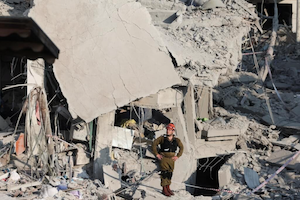Israel-Iran War: New York Times Reveals 7 Key Risks — Regime Collapse or U.S. Entanglement

On June 13, Israel launched a large-scale airstrike against Iran, code-named “Operation Rising Lion,” targeting Iran’s nuclear facilities, military bases, and high-ranking military officials. More than 200 Israeli fighter jets struck over 100 targets, with the primary focus on Iran’s main uranium enrichment site in Natanz. Missile bases, radar installations, and air defense systems were also destroyed.
At least 20 high-ranking Iranian military officers, including IRGC Commander Hossein Salami and Chief of Staff Mohammad Bagheri, along with 9 nuclear scientists, were reportedly killed in the attack. Israel’s intelligence agency, Mossad, is believed to have carried out precise assassinations of key figures inside Iran and disabled parts of its air defense network.
In retaliation, Iran launched approximately 200 missiles and drones, striking areas including Tel Aviv and Jerusalem. The assault killed at least three people and injured dozens. Israel claimed that most of the projectiles were intercepted by its defense systems, while Iran asserted that its missiles successfully hit critical Israeli energy infrastructure. Iran’s Supreme Leader Ali Khamenei condemned the Israeli airstrikes as an act of war and vowed severe retaliation. The International Atomic Energy Agency (IAEA) confirmed damage to the Natanz facility but said no radiation leak was detected, emphasizing that nuclear sites should not be military targets.
According to a New York Times analysis, this airstrike could be a turning point in the Middle East. Columnist Thomas L. Friedman wrote that although Israel demonstrated military prowess and dealt a major blow to Iran’s Revolutionary Guard and nuclear program, the strike was highly provocative and may push the region toward full-scale war. Friedman noted that Israel failed to completely eliminate Iran’s nuclear capabilities and criticized Tel Aviv’s approach as overly aggressive. He also warned that if the U.S. is drawn into the conflict, it could deepen domestic political divisions—particularly between Republican isolationists and pro-Israel factions.
Despite the risks, Israel claimed to have significantly weakened Iran’s nuclear capabilities, and some officials even declared control over Tehran’s airspace. Attacks on Iranian oil refineries also reportedly continue. Israeli Prime Minister Benjamin Netanyahu stated that operations would persist until Iran’s nuclear threat is completely neutralized, suggesting a long-term campaign.
The escalation has triggered international alarm. The United Nations Security Council convened an emergency meeting. China and Russia condemned Israel, accusing it of violating Iranian sovereignty, while the United States assisted in intercepting incoming missiles but denied direct involvement in the airstrikes. UK Prime Minister Keir Starmer announced the deployment of Royal Air Force jets to the Middle East as a precaution. The conflict has caused oil prices to surge and heightened instability across the region.
- 111 reads
Human Rights
Fostering a More Humane World: The 28th Eurasian Economic Summi

Conscience, Hope, and Action: Keys to Global Peace and Sustainability

Ringing FOWPAL’s Peace Bell for the World:Nobel Peace Prize Laureates’ Visions and Actions

Protecting the World’s Cultural Diversity for a Sustainable Future

Puppet Show I International Friendship Day 2020

